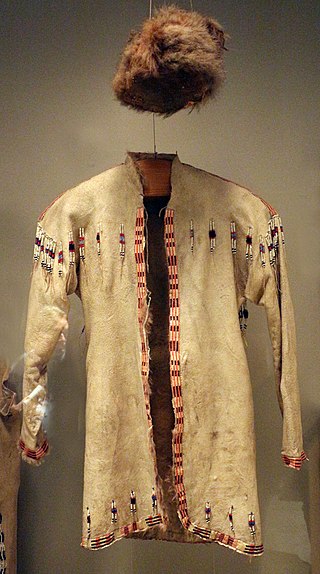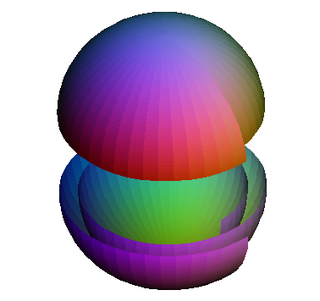Related Research Articles

Anvik is a city, home to the Deg Hit'an people, in the Yukon-Koyukuk Census Area, Alaska, United States. The name Anvik, meaning "exit" in the Central Alaskan Yup'ik language, became the common usage despite multiple names at the time, and may have come from early Russian explorers. The native name in the Deg Xinag language is Deloy Ges. The population was 85 at the 2010 census, down from 104 in 2000.
In algebra, the partial fraction decomposition or partial fraction expansion of a rational fraction is an operation that consists of expressing the fraction as a sum of a polynomial and one or several fractions with a simpler denominator.

Athabaskan is a large family of indigenous languages of North America, located in western North America in three areal language groups: Northern, Pacific Coast and Southern. Kari and Potter (2010:10) place the total territory of the 53 Athabaskan languages at 4,022,000 square kilometres (1,553,000 sq mi).
In mathematics, the remainder is the amount "left over" after performing some computation. In arithmetic, the remainder is the integer "left over" after dividing one integer by another to produce an integer quotient. In algebra of polynomials, the remainder is the polynomial "left over" after dividing one polynomial by another. The modulo operation is the operation that produces such a remainder when given a dividend and divisor.

The steel square is a tool used in carpentry. Carpenters use various tools to lay out structures that are square, many of which are made of steel, but the name steel square refers to a specific long-armed square that has additional uses for measurement, especially of various angles. It consists of a long, wider arm and a shorter, narrower arm, which meet at an angle of 90 degrees. Today the steel square is more commonly referred to as the framing square or carpenter's square, and such squares are no longer invariably made of steel ; they can also be made of aluminum or polymers, which are light and resistant to rust.

Deg Hitʼan is a group of Athabaskan peoples in Alaska. Their native language is called Deg Xinag. They reside in Alaska along the Anvik River in Anvik, along the Innoko River in Shageluk, and at Holy Cross along the lower Yukon River.

The Khanda is the symbol of the Sikh faith which attained its current form around the 1930s during the Ghadar Movement.
DEG or deg may refer to:
Deg Xinag is a Northern Athabaskan language spoken by the Deg Hitʼan peoples of the GASH region. The GASH region consists of the villages of Grayling, Anvik, Shageluk, and Holy Cross along the lower Yukon River in Interior Alaska. The language is severely endangered; out of an ethnic population of approximately 250 people, only 14 people still speak the language.
The Grũsi or Gurunsi languages, also known as the East Mabia languages, are a group of Gur languages, comprising about 20 languages spoken by the Gurunsi peoples. The Grũsi languages are spoken in northern Ghana, adjacent areas of Burkina Faso and Togo. The largest language in the Grusi group is Kabiye, a language spoken by approximately 1.2 million people throughout central Togo.

Holikachuk are a Yupikized Alaska Native Athabaskan people of the Athabaskan-speaking ethnolinguistic group to western Alaska. Their native territory includes the area surrounding the middle and upper Innoko River. Later in 1963 they moved to Grayling on the Yukon River.

In topology, the degree of a continuous mapping between two compact oriented manifolds of the same dimension is a number that represents the number of times that the domain manifold wraps around the range manifold under the mapping. The degree is always an integer, but may be positive or negative depending on the orientations.
In mathematics, the degree of a polynomial is the highest of the degrees of the polynomial's monomials with non-zero coefficients. The degree of a term is the sum of the exponents of the variables that appear in it, and thus is a non-negative integer. For a univariate polynomial, the degree of the polynomial is simply the highest exponent occurring in the polynomial. The term order has been used as a synonym of degree but, nowadays, may refer to several other concepts.
Holikachuk was an Athabaskan language formerly spoken at the village of Holikachuk (Hiyeghelinhdi) on the Innoko River in central Alaska. In 1962, residents of Holikachuk relocated to Grayling on the lower Yukon River. Holikachuk is intermediate between the Deg Xinag and Koyukon languages, linguistically closer to Koyukon but socially much closer to Deg Xinag. Though it was recognized by scholars as a distinct language as early as the 1840s, it was only definitively identified in the 1970s. Of about 180 Holikachuk people, only about 5 spoke the language in 2007. In March 2012, the last living fluent speaker of Holikachuk died in Alaska.
De Laurentiis Entertainment Group (DEG) was an entertainment production company and distribution studio founded by Italian producer Dino De Laurentiis. The company is notable for producing Manhunter, Blue Velvet, the horror films Near Dark and Evil Dead II, King Kong Lives, and Bill & Ted's Excellent Adventure, as well as distributing The Transformers: The Movie.

Deutsche Investitions- und Entwicklungsgesellschaft (DEG) is a Development Finance Institution (DFI) and a subsidiary of KfW Group. It was founded in Cologne in September 1962 as a federally owned company by the former Federal President Walter Scheel. Since its foundation, DEG has been headquartered in Cologne. In 2008, DEG moved into a modern, energy efficient office building in the city centre. DEG has 20 representative offices across the world, inter alia in Bangkok, Beijing, Istanbul, Jakarta, Johannesburg, Lagos, Lima, Mexico City, Nairobi, New Delhi, São Paulo and Singapore. In 2021, DEG employed a staff of approximately 650, both in Germany and abroad. DEG generated new business totaling EUR 1.5 billion in 2021 and the balance sheet total amounted to EUR 5.328 billion. Since its foundation, DEG has co-financed almost 1,300 companies in more than 120 countries.

The Alaskan Athabascans, Alaskan Athabascans, Alaskan Athapascans or Dena are Alaska Native peoples of the Athabaskan-speaking ethnolinguistic group. They are the original inhabitants of the interior of Alaska.
Shab deg or shab daig is slow cooked turnip and mutton stew, traditionally left to simmer overnight. "Shab" means 'night' and "daig" means 'cooking pot' in the Persian language. The dish has been described as Mughlai origin from the Kashmir Valley.
The dental ejective affricate is a type of consonantal sound. The symbol in the International Phonetic Alphabet that represents this sound is ⟨t̪͡θʼ⟩.
References
- 1 2 Deg at Ethnologue (18th ed., 2015) (subscription required)